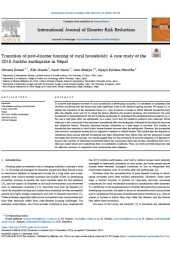Transition of Post-disaster Housing of Rural Households: A case study of the 2015 Gorkha earthquake in Nepal
Summary
In achieving rural post-disaster recovery in developing countries, comprehending recovery conditions and influential factors is vital. This study aimed to elucidate transitions in residential status after a disaster and uncover housing decision drivers. Surveyed 124 earthquake-affected rural households in Nepal, observing 50+ transition patterns. The immediate focus post-earthquake was on community relations, followed by physical and subjective factors, with financial influence emerging later. Households repairing or rebuilding increased after a year, but those moving to unrepaired houses didn't upgrade. Disparities were present even before leaving temporary housing. To prevent recovery inequality, aiding individual households before community recovery is crucial. Our study offers empirical insights for effective recovery in vulnerable rural communities.
Categories:
Case Studies
Writer:
Hitomu Kotani, Riki Honda, Saori Imoto, Lata Shakya, Bijaya Krishna Shrestha
Link Source:
https://doi.org/10.1016/j.ijdrr.2019.101443
Publisher:
International Journal of Disaster Risk Reduction
Published Year:
2020
